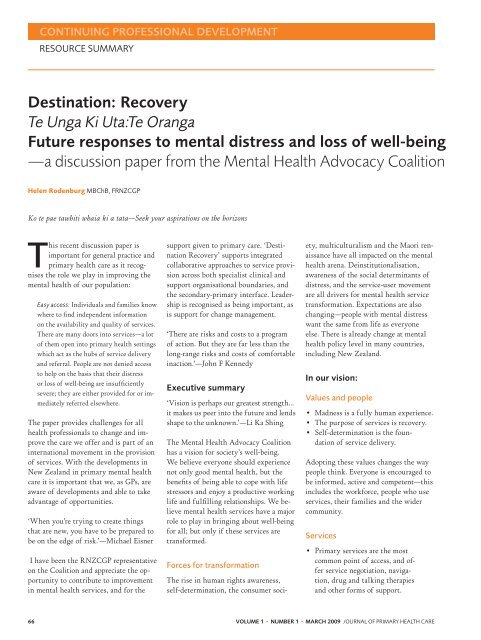entire issue. - The Royal New Zealand College of General ...
entire issue. - The Royal New Zealand College of General ...
entire issue. - The Royal New Zealand College of General ...
Create successful ePaper yourself
Turn your PDF publications into a flip-book with our unique Google optimized e-Paper software.
CONTiNUiNg PROfEssiONAL dEVELOPMENT<br />
REsOURCE sUMMARY<br />
destination: Recovery<br />
Te Unga Ki Uta:Te Oranga<br />
future responses to mental distress and loss <strong>of</strong> well-being<br />
—a discussion paper from the Mental Health Advocacy Coalition<br />
Helen Rodenburg MBChB, FRNZCGP<br />
Ko te pae tawhiti whaia ki a tata—Seek your aspirations on the horizons<br />
This recent discussion paper is<br />
important for general practice and<br />
primary health care as it recognises<br />
the role we play in improving the<br />
mental health <strong>of</strong> our population:<br />
Easy access: Individuals and families know<br />
where to find independent information<br />
on the availability and quality <strong>of</strong> services.<br />
<strong>The</strong>re are many doors into services—a lot<br />
<strong>of</strong> them open into primary health settings<br />
which act as the hubs <strong>of</strong> service delivery<br />
and referral. People are not denied access<br />
to help on the basis that their distress<br />
or loss <strong>of</strong> well-being are insufficiently<br />
severe; they are either provided for or immediately<br />
referred elsewhere.<br />
<strong>The</strong> paper provides challenges for all<br />
health pr<strong>of</strong>essionals to change and improve<br />
the care we <strong>of</strong>fer and is part <strong>of</strong> an<br />
international movement in the provision<br />
<strong>of</strong> services. With the developments in<br />
<strong>New</strong> <strong>Zealand</strong> in primary mental health<br />
care it is important that we, as GPs, are<br />
aware <strong>of</strong> developments and able to take<br />
advantage <strong>of</strong> opportunities.<br />
‘When you’re trying to create things<br />
that are new, you have to be prepared to<br />
be on the edge <strong>of</strong> risk.’—Michael Eisner<br />
I have been the RNZCGP representative<br />
on the Coalition and appreciate the opportunity<br />
to contribute to improvement<br />
in mental health services, and for the<br />
support given to primary care. ‘Destination<br />
Recovery’ supports integrated<br />
collaborative approaches to service provision<br />
across both specialist clinical and<br />
support organisational boundaries, and<br />
the secondary-primary interface. Leadership<br />
is recognised as being important, as<br />
is support for change management.<br />
‘<strong>The</strong>re are risks and costs to a program<br />
<strong>of</strong> action. But they are far less than the<br />
long-range risks and costs <strong>of</strong> comfortable<br />
inaction.’—John F Kennedy<br />
Executive summary<br />
‘Vision is perhaps our greatest strength…<br />
it makes us peer into the future and lends<br />
shape to the unknown.’—Li Ka Shing<br />
<strong>The</strong> Mental Health Advocacy Coalition<br />
has a vision for society’s well-being.<br />
We believe everyone should experience<br />
not only good mental health, but the<br />
benefits <strong>of</strong> being able to cope with life<br />
stressors and enjoy a productive working<br />
life and fulfilling relationships. We believe<br />
mental health services have a major<br />
role to play in bringing about well-being<br />
for all; but only if these services are<br />
transformed.<br />
Forces for transformation<br />
<strong>The</strong> rise in human rights awareness,<br />
self-determination, the consumer soci-<br />
ety, multiculturalism and the Maori renaissance<br />
have all impacted on the mental<br />
health arena. Deinstitutionalisation,<br />
awareness <strong>of</strong> the social determinants <strong>of</strong><br />
distress, and the service-user movement<br />
are all drivers for mental health service<br />
transformation. Expectations are also<br />
changing—people with mental distress<br />
want the same from life as everyone<br />
else. <strong>The</strong>re is already change at mental<br />
health policy level in many countries,<br />
including <strong>New</strong> <strong>Zealand</strong>.<br />
in our vision:<br />
Values and people<br />
• Madness is a fully human experience.<br />
• <strong>The</strong> purpose <strong>of</strong> services is recovery.<br />
• Self-determination is the foundation<br />
<strong>of</strong> service delivery.<br />
Adopting these values changes the way<br />
people think. Everyone is encouraged to<br />
be informed, active and competent—this<br />
includes the workforce, people who use<br />
services, their families and the wider<br />
community.<br />
Services<br />
• Primary services are the most<br />
common point <strong>of</strong> access, and <strong>of</strong>fer<br />
service negotiation, navigation,<br />
drug and talking therapies<br />
and other forms <strong>of</strong> support.<br />
66 VOLUME 1 • NUMBER 1 • MARCH 2009 J OURNAL OF PRIMARY HEALTH CARE

















